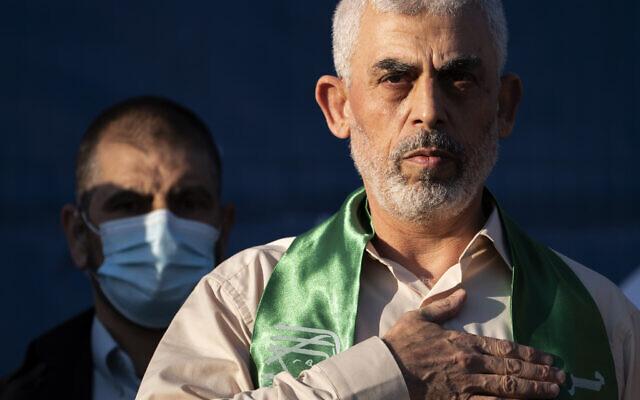
Sinwar’s growing fatalism, hope for regional war hampering hostage talks — report
Hamas chief Yahya Sinwar’s long-running assessment that he will not survive the Gaza war has strengthened in recent weeks, making a truce-hostage deal all but unattainable, even as his hope that Iran and Hezbollah would start a larger regional war with Israel could be finally materializing, The New York Times reported Friday.
Citing unnamed US officials, the Times said Hamas has shown no willingness to engage in negotiations for a deal in recent weeks, bringing them to a virtual standstill. The officials reportedly suspect this stems from Sinwar growing more resigned to his fate as Israel closes in, and his anger at the killing of his Doha-based predecessor, Ismail Haniyeh, who had been Hamas’s lead negotiator.
Haniyeh, who was killed in a blast in Tehran in July, had been more inclined than Sinwar to reach a deal, and willing to push back on the Gaza-based terror chief’s more extreme demands, according to the Times.
His death was blamed on Israel, which has not taken credit.
Meanwhile, US officials were cited as saying, Sinwar thinks a regional war would force Israel to scale back operations in Gaza — potentially precluding his need to release hostages to secure a ceasefire in the embattled Strip.
However, Iran and Hezbollah’s apparent reluctance to launch an all-out war with Israel after October 7 was a sign of his miscalculation in launching the onslaught, according to the US officials quoted in the Times.
The newspaper quoted a senior US official saying Iran’s relative inaction over the past few months had conveyed to Sinwar that “the cavalry is not coming.”
Moreover, the Times said, Hamas’s war effort in Gaza is yet to see any benefit from Israel’s recent escalation with Iran and its Lebanese proxy Hezbollah.
Even after Iran’s ballistic missile strike on Israel Tuesday night, US officials — though supportive of Israel’s right to strike back — are unconvinced Tehran wants to start a war with Israel or intervene on behalf of Hamas, according to the Times.
However, the Times said, US officials are waiting to see whether Israel’s tensions with Iran escalate further.
The report also pushed back on recent speculations, based on a relative lack of communications, that Sinwar had been killed. US officials cited by the Times said he is likely still alive, though his communications with Hamas have become strained since he relies on a network of human couriers and has avoided using electronic communication devices for many months.
Tuesday’s ballistic missile strike — Iran’s second-ever direct attack on Israel, which drove millions into bomb shelters across the country — came a day after Israel began ground operations against Hezbollah in Lebanon, following a week of intense airstrikes that had decimated the Iran-backed terror group’s top command.
Hezbollah began attacking Israeli border communities on October 8, a day after the war in Gaza was sparked when thousands of Hamas-led terrorists stormed southern Israel to kill nearly 1,200 people and take 251 hostages.
Source » timesofisrael.com





